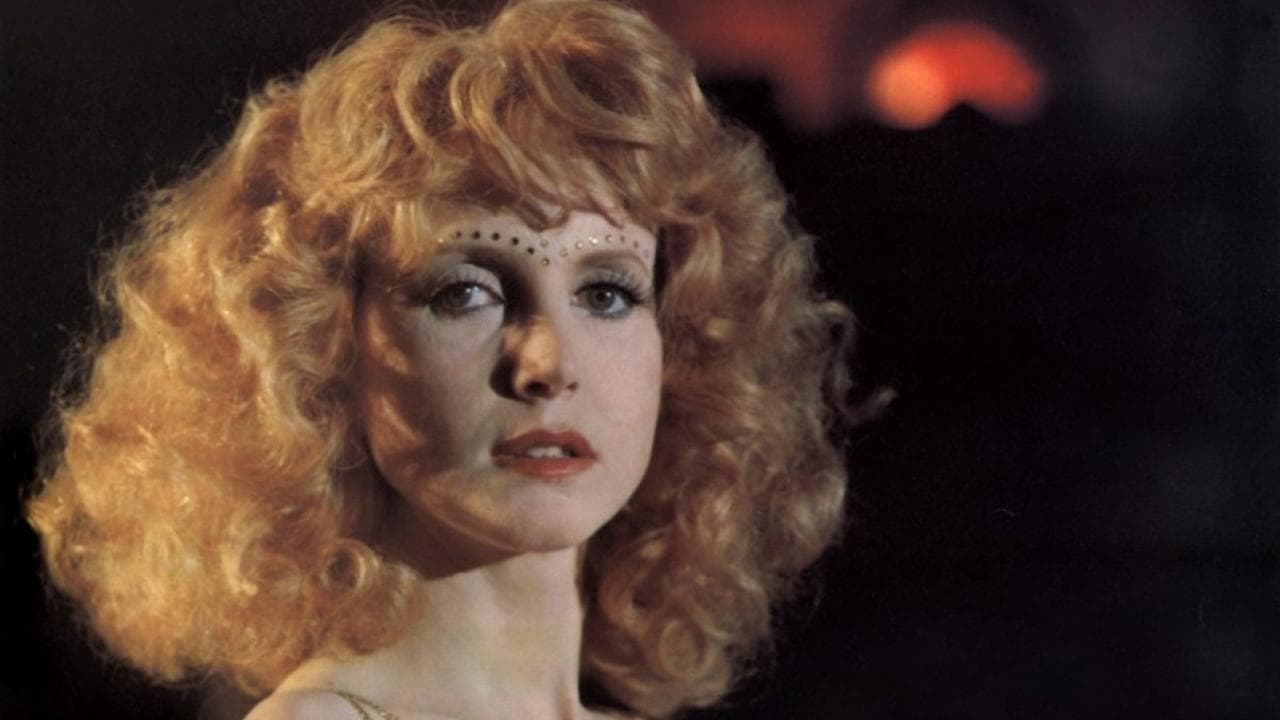

In memory of the passing of Nouveau Vague spearhead Jacques Rivette (1928-2016), let's delve into WOMEN DUELLING, the follow-up of his pièce de résistance, CELINE AND JULIE GO BOATING (1974).The story is a convoluted mythopoeia, in modern-day Paris, with a close-knit cast of 7 (where two of them will exit the narrative earlier), it cobbles together a fantasy about two goddesses, Leni (Berto), the daughter of the moon and Viva (Ogier), the daughter of the sun, each year they only have 40 (une quarantaine) days to stay on earth. So in order to be endowed the power to remain here, both are seeking for a magic diamond, which is in the possession of a mysterious man Pierrot (Babilée, an agile dancer ), meanwhile his younger sister Lucie (Karagheuz) and his "ticket girl" Elsa (Garcia), who works in a dance club, are also drawn into the manipulative game instigated by Leni and Viva.Shot with a subdued palette, the picture refuses to grant easy access towards the motivations of its characters at the beginning, audience can only patch pieces of information together after an occult face/off between Leni and Viva in the middle point, then the plot device becomes clear, it seems an ultimate duel between them is inevitably scheduled for the climax, but Rivette mischievously rebuffs a supernatural bravura, and outsources the task to a human being to banish both goddesses out of our universe.As a fantasy piece, Rivette barely avails himself of special effect to sate viewers' triggered expectation, and utilises the more practical sleight of hand (editing, lightning and sound effect) to create the supernatural elements in the film. And there is a ubiquitous pianist (played by Jean Wiener) chaperons the narrative with his improvised music to condense a sublime sensation of mystics and metaphysics, conveyed through the overtly hollow and stilted dialogs.In the main, WOMEN DUELLING is off-kilter, tongue-in-cheek and chicly inviting, a telling testimony that Rivette's cinematic wonderland is sheer one-of-a-kind, and challenges our accepted viewing habits up to the hilt!
... View MoreThere is a question whether this film is about opposites or contradictions. Neither. It is about sameness. For all the talk, Viva and Leni have the same goals, the same plan, the same path. Elsa/Jeanne are not a dichotomy of two personalities in one person, simply the same person whether in the dance hall or not, and her aspiration to the magical diamond is too much for her simple self. The protagonists are no better than the antagonists. Don't argue, it's true.Next question: Another reviewer asks: "What does it mean when Jean Babilee, outdoing Travolta, raises his arm and smashes a dancehall mirror through telekinesis?" Pierrot (the clown) is the foil, stronger than the females believe, or want to believe. Only progressives will be dumbfounded at the superiority of the male, or at least Rivette making this cinema assertion.Next question: The same reviewer asks: "Why does he wake up in the bottom of a parking garage and talk about killing a sister we've never seen?" Pierrot lives the life of simplicity, even Christ. It is not Viva who is the God figure, but Pierrot. The allusion to "sister" may be Satan. Why a female Satan? Again, this film holds up male superiority over female wiles. It is Pierrot who plays Viva and Leni from the start - he is never fooled, no matter how beautiful they are.Next question: The same reviewer asks, "Why does he become graceful and muscular, almost superhuman, when Bulle Ogier counts backwards and changes the universe to black-and-white?" If you haven't guessed, the male is superior. He is the most graceful, or full of Grace, if you like. There are many religious aspects here if one is open to it, obvious and overt.Next question: The same reviewer asks: "Why does Juliet Berto keep changing her costume?" Evil unmasked must always put on a new face. Today's fascist is tomorrow's "progressive" or "nationalist" (naturally, what I just said is up for further debate).Next question: The same reviewer asks: "How do you escape the dancehall?" A great question. The piano player, always rancorous, ever soothing, sets the tone for much of the dialogue. This indicates the backdrop of universal law (music) to which we all must dance or otherwise yell over. The dancehall is not really a prison, but a perceived prison. One may leave anytime, if one wishes. The actual question most people ask is not "How do I leave?" but rather "How do I change the music?" In other words, they like the fun but not the rules.I found this film to be a 1970's gem of low-budget quirkiness, whether this was deliberate from Rivette, of necessity due to funding, or by accident in post-production. The story is slight, not really complicated, good vs. evil, with a few nihilist elements that "None are good, no, not one." Nothing Tarantino or Peckinpah, not DeNiro evil, just female temptation, and not even in all its succubus delight.I recommend this film not as art but as basic entertainment, with cute leads (especially Bulle Ogier), slight lesbian overtones, meaningless dramatic interplay, and a cool surreal ending.
... View MoreJust as "Céline et Julie vont en bateau" owed a great deal to the American cinema of the fifties,so its follow-up "Duelle" pays homage to certain films of the forties,in particular the work of Jacques Tourneur whose work created the maximum of suspense and fear with the minimum of means.This slight,ghostly tale of two goddesses of the sun and the moon who are permitted to spend only forty days on earth per year has a strange,ethereal quality which recalls the ambiguity and hidden menace of "Cat People".The playing in the lead roles of Rivette regulars Bulle Ogier and Juliet Berto is mesmerising,whilst the settings in a race-track,run-down hotel,a deserted metro station and a dance hall have a seedy,haunted feeling,and while the story might seem rather opaque,Rivette has confirmed that in order to understand it fully it is necessary to read two French novels,"Le Carnaval" and "La Femme celte" which are unfortunately both out of print.
... View MoreThis is part one of what was to be Jacques Rivette's four-part project "Scenes de la Vie Parallelle". The idea was to create four different films with a running sub-plot involving a mythical war between goddesses of the Sun and the Moon, fighting for possession of a mysterious jewel. This one was a "film noir" modelled after "The Seventh Victim" (which Rivette screened for the cast before the shooting began) with bits of "Kiss Me Deadly", "Lady From Shanghai" and "Les Dames du Bois de Boulogne" thrown in for good measure. An uncanny mood piece it takes place in a weirdly unpopulated Paris. Jean Weiner (who used to play piano at "Le Bouef sur le Toit") supplies live piano improvisations here, much in the manner of an accompanist for a silent movie."Noroit" the second film in this series was a pirate adventure movie inspired by "Moonfleet" utilizing Tourneur's "The Revenger's Tragedy" as a frequently recited text --much in the way that Cocteau's "The Knights of the Roundtable" is quoted here.After these two Rivette began "Marie et Julien" with Albert Finney and Leslie Caron, but suffered a nervous breakdown three days into shooting. This brought the project to an end. This year (2003) however, he's gone back to "Marie et Julien" again with Emmanuelle Beart and Jerzy Radzilowitz. Maybe the four-part project will be compeleted after all.
... View More